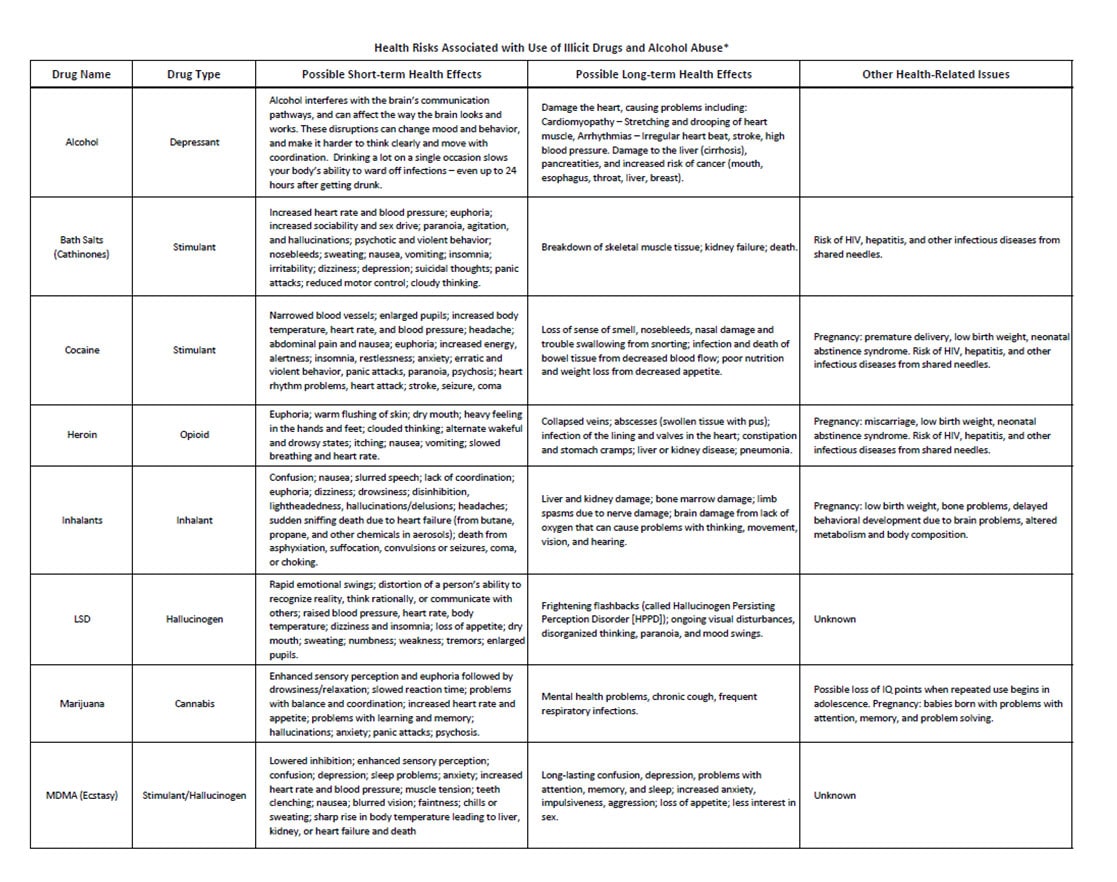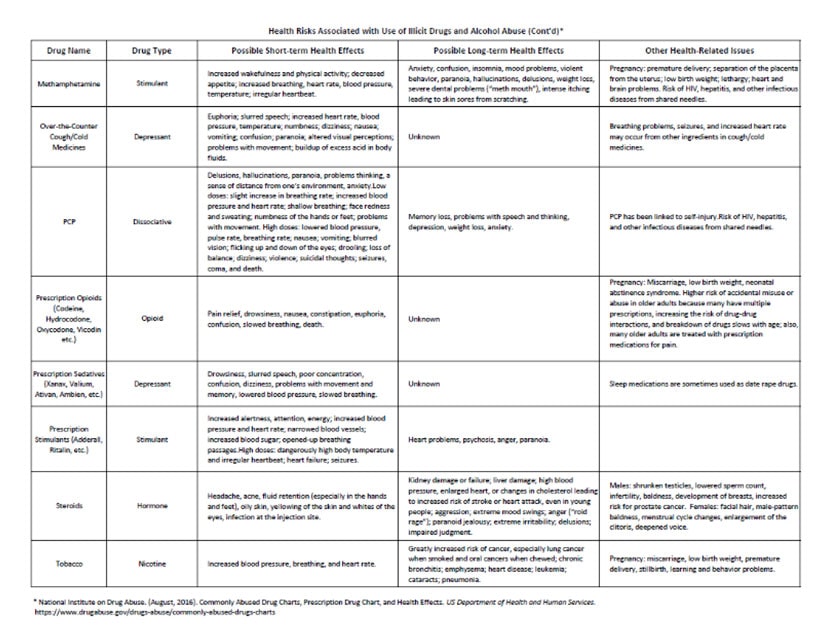Oregon Tech is invested in the health and wellness of the campus community, and as such has established policies and programs addressing drug and alcohol abuse prevention for students, faculty, and staff. To that end, the following information is provided in order to not only comply with federal regulation but to increase awareness of policies and support programs, and to connect the campus community to resources both on and off-campus.
Campus Policies Related to Drug and Alcohol Abuse
Prohibitive Standards of Conduct
Oregon Tech has multiple policies which specifically prohibit the unlawful possession, use, or distribution of illicit drugs and alcohol. Click on each Policy Number below to view the full policy content.
30-031 Section IIA (“Possession and Consumption of Alcoholic Beverages Policy”) - Specific to: All students and employees. Summary: prohibits the sale of alcohol, providing alcohol to minors, or possessing on campus; also prohibits consuming alcohol if it results in adverse effects or violates laws; prohibits alcohol at athletic events.
30-033 Section I (“Controlled Substance Policy”)– Specific to: All students and employees. Summary: prohibits use of, possession, and sale of illicit drugs.
30-034 (“Drug-free Campus Policy”) – Specific to: All students and employees. Summary: Establishes a drug-free campus (note: dated 8/15, after the Oregon marijuana legalization law went into effect).
30-035 (“Smoke and Tobacco Free Campus”) – Specific to: All students and employees. Summary: declares Oregon Tech to be smoke and tobacco-free.<>
Student Code of Conduct, Section III, Chapters 5, 14, 15, and 16. Specific to: Students. Summary: Prohibits, tobacco, drug, marijuana (specifically), and alcohol use.
Applicable Legal Sanctions
Oregon Tech policy provides information to the campus community regarding legal sanctions that can be imposed under Federal, state, and local laws and ordinances for unlawful possession or distribution of illicit drugs and alcohol. Click on each Policy Number below to view the full policy content.
30-033 Section IIE (“Controlled Substance Policy”) – Specific to: All students and employees. Summary: Provides legal sanctions which can occur as a result of controlled substance use.
Specifically, the policy states:
* Institutional sanctions for students: Disciplinary actions for students may range from warning to expulsion as provided by the Oregon Tech Student Handbook, and may include referral to the Integrated Student Health Center or another agency for evaluation and/or treatment. Students receiving federal financial aid may lose the aid. Students may also be referred for prosecution by the legal system. The severity of the sanction will depend, in part, on whether this is a first incident or a repeat violation, the seriousness of the misconduct, and the student’s attitude.
* Institutional sanctions for employees: Disciplinary action for an employee may range from referral to an employee assistance program or drug treatment program through the Office of Human Resources, to termination from employment and/or referral for prosecution.
* State of Oregon sanctions for students and employees: Oregon Tech students or employees who violate drug laws are subject to prosecution in the courts in addition to any action taken by the institution. Penalties for possession of illicit drugs are determined by the Controlled Substance Schedule upon which the drug appears.
Oregon state law and penalties specific to Controlled Substances are found in Chapter 475 while those specific to Alcohol are found in Chapter 471.
Federal Drug Trafficking Penalties (according to the Drug Enforcement Administration are as follows:
|
DRUG/SCHEDULE |
QUANTITY |
PENALTIES |
QUANTITY |
PENALTIES |
|
Cocaine (Schedule II) |
500–4999 grams mixture |
First Offense: Not less than 5 yrs, and not more than 40 yrs. If death or serious injury, not less than 20 or more than life. Fine of not more than $5 million if an individual, $25 million if not an individual. Second Offense: Not less than 10 yrs, and not more than life. If death or serious injury, life imprisonment. Fine of not more than $8 million if an individual, $50 million if not an individual. |
5 kgs or more mixture |
First Offense: Not less than 10 yrs, and not more than life. If death or serious injury, not less than 20 or more than life. Fine of not more than $10 mil- lion if an individual, $50 million if not an individual. Second Offense: Not less than 20 yrs, and not more than life. If death or serious injury, life imprisonment. Fine of not more than $20 million if an individual, $75 million if not an individual. 2 or More Prior Offenses: Life imprisonment. Fine of not more than $20 million if an individual, $75 million if not an individual. |
|
Cocaine Base (Schedule II) |
28–279 grams mixture |
280 grams or more mixture |
||
|
Fentanyl (Schedule II) |
40–399 grams mixture |
400 grams or more mixture |
||
|
Fentanyl Analogue (Schedule I) |
10–99 grams mixture |
100 grams or more mixture |
||
|
Heroin (Schedule I) |
100–999 grams mixture |
1 kg or more mixture |
||
|
LSD (Schedule I) |
1–9 grams mixture |
10 grams or more mixture |
||
|
Methamphetamine (Schedule II) |
5–49 grams pure or 50–499 grams mixture |
50 grams or more pure or 500 grams or more mixture |
||
|
PCP (Schedule II) |
10–99 grams pure or 100–999 grams mixture |
100 gm or more pure or 1 kg or more mixture |
||
|
PENALTIES |
||||
|
Other Schedule I & II drugs (and any drug product containing Gamma Hydroxybutyric Acid) |
Any amount |
First Offense: Not more than 20 yrs. If death or serious injury, not less than 20 yrs, or more than life. Fine $1 million if an individual, $5 million if not an individual. Second Offense: Not more than 30 yrs. If death or serious bodily injury, life imprison- ment. Fine $2 million if an individual, $10 million if not an individual. |
||
|
Flunitrazepam (Schedule IV) |
1 gram |
|||
|
Other Schedule III drugs |
Any amount |
First Offense: Not more than 10 years. If death or serious injury, not more that 15 yrs. Fine not more than $500,000 if an individual, $2.5 million if not an individu- al. Second Offense: Not more than 20 yrs. If death or serious injury, not more than 30 yrs. Fine not more than $1 million if an individual, $5 million if not an individual. |
||
|
All other Schedule IV drugs |
Any amount |
First Offense: Not more than 5 yrs. Fine not more than $250,000 if an individ- ual, $1 million if not an individual. Second Offense: Not more than 10 yrs. Fine not more than $500,000 if an individ- ual, $2 million if other than an individual. |
||
|
Flunitrazepam (Schedule IV) |
Other than 1 gram or more |
|||
|
All Schedule V drugs |
Any amount |
First Offense: Not more than 1 yr. Fine not more than $100,000 if an individual, $250,000 if not an individual. Second Offense: Not more than 4 yrs. Fine not more than $200,000 if an individ- ual, $500,000 if not an individual. |
||
Policy Distribution
Student Distribution
Oregon Tech distributes these policies which relate to alcohol and other drug use in a variety of ways to the student body. Specifically:
- The Dean of Students sends an e-mail to all students at the beginning of the academic school year in regard to maintaining a drug-free educational environment. Included in this notification are a copy of the Oregon Tech Controlled Substance Policy (OREGON TECH-30-033), which includes a list of sanctions, and health risks associated with use or abuse of specific drugs.
- The Director of Human Resources sends an e-mail to all students, faculty, and staff at the beginning of each term which outlines the Drug-free Campus policies, and provides links to resources.
- The Student Code of Conduct is available to all students on the Oregon Tech webpage.
- The Registrar’s Office distributes a message during the fifth week of fall term, after registration has closed. This e-mail to all students notifies them where they can find certain information, including drug and alcohol policies and sanctions. There is a direct link to the website information.
- New students are given the Oregon Tech Student Academic Planner, which includes policies regarding drug-free campus, marijuana possession and use, possession of alcoholic beverages, as well as the smoke and tobacco-free campus.
- Students at each Orientation (Fall, Winter, and Spring) are provided information about the student Code of Conduct as well as other substance use policies.
- Residence Life training for the Resident Assistant student leaders is implemented annually, during which substance abuse policies are reviewed.
- The New Student Orientation team (NSO team) and Associated Students of Oregon Institute of Technology (ASOIT) program leaders attend an annual training to help them understand policies and procedures.
Faculty and Staff Distribution
Similarly, Oregon Tech distributes policies which relate to alcohol and other drug use in a variety of ways to the institution employees. Specifically,
- The Drug-free Campus Policy Notice (which overviews the policy, 30-034) is issued annually via individual Oregon Tech e-mail to all faculty and staff.
- Notice of policies for faculty and staff and the web-based location of Oregon Tech’s policies and information pages are presented during new employee orientation sessions, which are required of new faculty and staff, regardless of their start date.
- All substance abuse policies are included in the Adjunct Faculty handbook. Additionally, these policies are reviewed annually in the mandatory Advisor training, which all new faculty must attend.
- The Human Resources office maintains all institutional policies and procedures on the departmental webpage at https://www.oit.edu/faculty-staff/human-resources/policies
Health Risks Associated with Use of Drugs and Alcohol
According to the National Institute on Drug Abuse, the following are potential health risks which can occur as a result of drug and alcohol use:


Drug and Alcohol Counseling Resources
Oregon Tech students who have paid the Student Health Fee (automatically assessed if registered for 6 or more on-campus credits), are able to seek confidential drug and alcohol assessment and counseling at the Integrated Student Health Center. Faculty and staff are eligible for drug and alcohol counseling through the Employee Assistance Program (EAP). Additionally, in Klamath Falls, community resources that may provide substance abuse counseling and assessment can be found on this page: KF Community Resources. In Portland-Metro, similar community resources are located here: PM Community Resources.
Oregon Tech Drug and Alcohol Prevention Program
In compliance with the Drug-Free Schools and Communities Act (DFSCA) and Part 86 of the Department of Education's General Administrative Regulations, Oregon Tech re-evaluates its Drug and Alcohol Prevention Program (DAAPP) every other year. This Biennial Review, authored by the Substance Abuse Commission, can be found at the bottom of this page, under "File Downloads/ Oregon Tech Biennial Review"). As a summary, the key components are summarized here:
* Environmental Model: Oregon Tech has implemented an environmental prevention approach as suggested by best practice research. Although seminal in nature (having been developed in the early 2000’s), the environmental model has been consistently confirmed by research as having an impact upon college student substance abuse. The National Institute of Alcohol Abuse and Alcoholism has encouraged institutions of higher education to include a combination of both environmental and individual strategies in their DAAPPs. Environmental aspects of the Oregon Tech DAAPP include supporting alcohol-free options, creating a normative environment, limiting alcohol availability, reducing the marketing and promotion of alcohol, and developing and enforcing institutional policies.
* Individual Approaches: As is consistent with the most recent best practices research according to the National Institute on Alcohol Abuse and Alcoholism, Oregon Tech has also included individual approaches in its DAAPP in order to target high-risk student populations. The two most widely implemented prevention programs qualify as having “Higher Effectiveness” according to the NIAAA Alcohol Intervention Matrix; meaning, that 75% or more of studies which investigated these types of interventions found them to have a positive impact. Specifically, Oregon Tech implemented a skills-training program which included intention-setting (Choose Well), and an on-line education program specific to student athletes. Further, the counseling staff at the Integrated Student Health Center employed brief motivational interviewing when working with substance abusing students (a strategy deemed to be have “Moderate Effectiveness” by NIAAA, as between 50% and 74% of studies researching this technique showed positive impact upon college student substance use.







